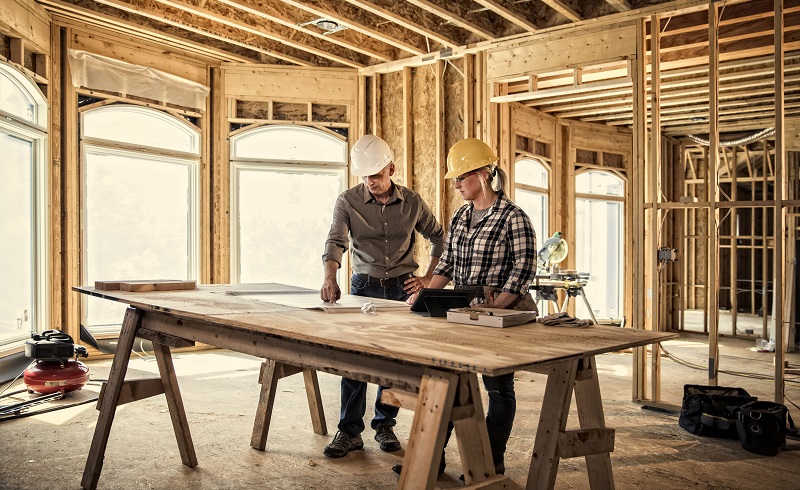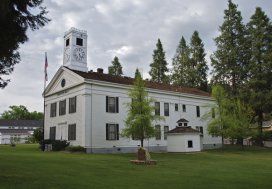From college towns to vacation spots or places like California where real estate is expensive and in limited supply, converting a single-family home into a duplex or multi-unit building can have big economic benefits. But the renovation isn’t as simple as putting up some drywall and creating a separate entrance. Here are some questions to consider before you launch into the project of remodeling a single-family home and converting it into a multi-family one.
- Is the location of the property zoned for multi-unit occupancy?
The first step to take if you want to convert a single-family home into a duplex or multi-unit building is to check the zoning restrictions for the neighborhood the property is located in. Zoning varies from town to town, and some locations simply will not allow the conversion. Still others, such as in locations where there’s a shortage of housing, may even encourage it. For example, California is encouraging property owners to add ADUs, or additional units to help meet the demand for more housing.
City Hall and the local municipal building department can provide information on zoning restrictions. They can also tell you about types of permits you’ll need for such a conversion. In some cases, you may need to apply for zoning waivers or even try to get an area rezoned.
The Difference Between an ADU and a Secondary Unit
As you look at adding an extra unit or units to a property, it’s important to distinguish between an in-law, or ADU unit, and a secondary unit.
According to the Sacramento Appraisal Blog, a secondary unit is one that is:
- Recognized by the city or county as a secondary unit.
- Most likely has separate utility meters than the other unit(s).
- Most likely has a separate address.
- Is close in size to the other unit.
- May or may not be attached to the other unit.
https://sacramentoappraisalblog.com/2014/06/17/is-it-a-second-unit-or-an-accessory-dwelling/
By comparison, ADUs:
- Are not recognized by the city or county as a second unit.
- Have lower market value than the bigger, main unit.
- Are smaller than the main unit
- May or may not be separately metered.
- May or may not have a separate address.
- May or may not be attached to the main house.
Understanding these differences can impact how much rent you can expect, how you’ll market the property, and also how you’ll approach getting approvals from local building authorities.
- Does the plan meet all legal and safety requirements?
There are specific safety and legal requirements that come into play when converting a single-unit building into a multi-unit one. Also, make sure to get specifics from your local building authority.
- Each unit must have at least one entrance leading to outside.
- Each unit must have its own bedroom or sleeping area, a bathroom, and a kitchen or kitchen area.
- Depending on the laws in your area, each unit may need its own water, electricity, and gas meter.
- Each unit may have fire codes that are different from the codes for the building when it was a one-unit building.
- Each unit must have proper heating, cooling, and ventilation that is up to code with local building laws.
- Will the neighbors we ok with the conversion?
Another factor to consider is the impact of the conversion on the neighborhood. Adding additional units to an existing building can impact parking, noice, and overall population density in the neighborhood. It can also change the character of the neighborhood as well as impact home values.
You might take all the legal steps you need to convert the home, but if you have resistant neighbors who are angry and/or complaining to City Hall, it can impact the quality of life for everyone involved, and end up being a decision you wish you had not made.
- What will the project cost and will the conversion impact the resale value of the property?
As with any major renovation, adding additional units to an existing building can be costly, so getting clarity on all costs ahead of time is essential. According to Homes.com, the most costly parts of the conversion will be adding a kitchen and a bathroom. Notably, as we mentioned in our post about bathroom remodel costs, plumbing upgrades and additions, especially moving plumbing such as sewer and water lines, can come with a high price tag. Some estimates put this cost in the $10,000 – $30,000 range.
https://intempuspropertymanagement.com/bathroom-remodel-cost/
Mortgage Costs
While you don’t necessarily have to tell your mortgage lender that you’re making such a conversion to your property, if you plan to get another mortgage from them in the future, if you plan to refinance, or even take out a home equity loan, the conversion could impact your rates. In some cases, lenders see multiple residents on the property as riskier. However, if the conversion actually increases the value of the property, lenders can view it favorably.
Once you get estimates from general contractors and other professionals who are going to work on the conversion, then you can do research on comps and do an analysis on the kind of ROI you can get from the project, whether in rental income or resale value. A professional real estate agent and/or a property management company will have the expertise and knowledge about the market in your particular area and can advise you about housing and rental prices. This can help you determine whether the project will be financially beneficial.
https://intempuspropertymanagement.com/
- Does the local rental market justify the conversion?
As mentioned above, the local rental market is going to heavily impact the ROI that you get from this type of renovation. Getting comps on rent prices for similar units in the area is essential.
In addition, being familiar with local vacancy rates will give you a clearer picture on actual annual income from the property. For example, if it’s located in a college town that’s active during the school year, but harder to rent during the summer, you’ll need to take this into consideration when estimating ROI.
Similarly, if you’re in the suburbs where the homes are all single-family, or you don’t have access to good public transportation, your rental unit may not be as competitive as an apartment in the nearby city. Comparisons in home sales matter – and they do in the rental market as well.
- Will there be an impact on property taxes?
Converting a single-family home into a duplex or multi-unit building will have an impact on your property taxes. According to Homes.com, it could impact your taxes in the following ways:
- Your property taxes will most likely go up.
- However, you will have more deductions since the additional unit or units will be seen as an investment property, so you’ll have a new set of deductions that you can’t have with your primary residence.
- You’ll be able to deduct: property taxes, maintenance costs, utilities, mortgage interest, and insurance on the additional unit(s).
- You could qualify for a homestead exemption on your primary residence.
Converting a single-family home can bring extra income to you as well as provide more people with a great place to live. Planning ahead and getting a clear assessment on all costs and regulations will ensure you make the best decision for your budget and goals.
Work with the Property Management Experts
Intempus Property Management has been serving satisfied property owners for two decades. We pride ourselves in helping our clients get the most from their real estate investments while also providing a low-stress and hassle-free experience. We also love helping tenants find the perfect place to live. So, whether you’re looking to buy, sell, or rent a property, contact us. One of our friendly team members will be happy to answer any questions you have!





